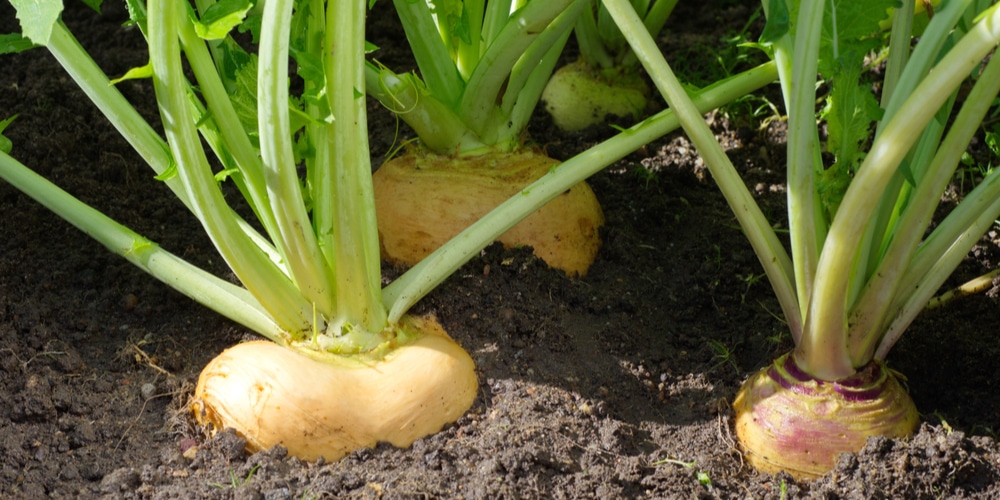Many gardeners believe that they cannot grow vegetables during the winter because of the cold weather. However, this is not true! You may be wondering, ‘can turnips survive frost?’ Many vegetables can be grown in colder climates, and turnips are one of them.
This blog post will discuss the benefits of growing turnips in your garden during the winter and how to ensure that they survive frosty temperatures.
What Is Turnip And Can Turnips Survive Frost
From carrots to kale, various vegetables can tolerate cold weather and even thrive in winter conditions. These so-called hardy vegetables are typically grouped based on their ability to withstand frost and cold temperatures.
For example, turnips are one type of hardy vegetable that can survive temperatures as low as 20˚F. Other examples of hardy vegetables include cabbage, Brussels sprouts, and onions.
While these vegetables can withstand colder temperatures, they still need some protection from the elements, especially if frost is expected.
One way to provide extra protection is to grow hardy vegetables under a layer of mulch, which can help insulate the plants and keep them from suffering damage from the cold. With a little care and attention, hardy vegetables can provide a fresh and tasty addition to your winter menu.
How To Plant Turnip
Turnips are a cool-weather crop that can be planted in the spring or fall. When choosing turnips, look for firm, small to medium-sized roots with smooth, bright skin. Avoid any soft root vegetables that have blemishes or are too large.
Before planting, loosen the soil in your garden bed and add some compost or manure. Then, space the turnip seeds about 3 inches apart and 1 inch deep.
After planting, water the bed gently and keep it moist until the plants are established, once they have sprouted, thin out the weaker seedlings to make the remaining plants about 8 inches apart.
When To Harvest Turnip
Anyone who has ever gardened knows that getting the timing right is essential for a successful crop. This is especially true for root vegetables like turnips, which can be challenging to store over winter.
If you want to enjoy turnips throughout the cold months, it is important to plan. Spring-planted turnips will not last through the winter, so they should be harvested as soon as they are ready.
However, summer-planted crops can usually be made to last until late fall or even winter. Turnips withstand frost well and don’t need to be dug until the ground freezes.
Therefore, if you are not in danger of a freeze, you can seed them late for a late fall or early winter harvest. With a bit of planning, you can enjoy turnips all winter long.
The best time to harvest turnips is when they reach maturity or hit about 2 to 3 inches in diameter. This medium size ensures optimum flavor and tenderness. They can be harvested earlier when around 1 to 2 inches, but they should not be harvested much later. At that point, turnips get pithy and lose their flavor.
How To Store Turnip Over Winter
If you want your turnips to last all winter, it is essential to store them properly. The first step is to cure them after harvest. This means letting them sit in a cool, dark place for about a week so that the skin can toughen up and they can develop its full flavor.
After curing, turnips can be stored in a cool, dark place like a basement or root cellar. They will keep best if they are placed in a container lined with sand or sawdust.
Benefits Of Planting Turnip In Your Garden
There are many benefits to planting turnips in your garden. For one, they are an excellent food source for both you and your animals. Turnips are packed with nutrients, including vitamins A and C, potassium, and calcium.
They can be eaten raw, cooked, or even pickled, making them a versatile addition to any meal. What’s more, turnips are relatively easy to grow and require little maintenance.
They are also relatively drought-resistant, which is a valuable trait in many parts of the world. Finally, turnips can help to improve the overall health of your soil.
Their deep roots help to loosen compacted soil, and their leaves provide a natural mulch that helps retain moisture. As a result, turnips can be a valuable asset in any garden.
Can turnips survive frost: Conclusion
Turnips are a versatile and hardy vegetable that can add flavor and nutrition to your winter menu.
With a bit of care, they can be planted in the spring or fall and provide a tasty addition to your winter meals. When harvesting turnips, timing is essential. They should be harvested when they reach maturity. With proper storage, turnips can last all winter long.
Related Article: When to Plant a Garden?

